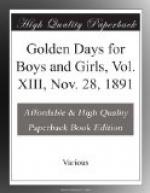“Good-by, Mr. Herdic!” he said, extending his hand. “It’s a chance if we live to see each other again.”
“Good-by!” replied Mr. Herdic, in a choked voice; “and God be with and care for you, my dear boy.”
Thad’s deathly pale lips tried to form some intelligible sound, but failed, and, with a kind of dumb entreaty, he put his arms around Phil’s neck, and dropped his head despairingly on the other’s shoulder.
“Lelia did better than this,” thought Phil, but he was too generous to say so, and when Thad sobbed out, “Will you stay by me, Phil?” he answered, quickly, “Yes, I will, upon my honor!”
In that moment of supreme peril, Thad seemed to prefer the help and protection of his brave young enemy to that of his uncle—strong man and good swimmer as was the latter.
The boom of a minute gun rang out above the roar of the tempest, and a second after a rocket went whizzing into the inky blackness, to burst into a shower of blue fire and fall hissing into the sea.
Another and another followed in quick succession; then came a mighty crash. The mast went by the board, carrying with it four sailors who had sought safety in the rigging.
The vessel broached to, lying broadside on the reef, the waves making a complete breach over her, and leaving her at the merciless sea. Thad uttered an unearthly shriek, and clung to Phil, who, in turn, clung to the iron grating of the companion-way. The cook had secured a mattress, the cabin-boy a door, and Mr. Herdic—but Mr. Herdic was gone; so, too, was Don Casimer, the captain, and Mr. Rolf.
The doomed steamer broke in two amidships, and all her upper works floated off, with such of her crew and passengers as had not already been engulfed in the pitiless flood.
The harsh rending asunder of strongly-riveted iron-plates, the surge and jar and strain of breaking timbers, was the last sound Phil was conscious of before he found himself thrown bodily into the sea, with Thad held in such a way in his arms as to keep the poor boy from grasping his neck, in his frantic struggles to keep his head above the waves.
Phil was stunned, breathless, half-strangled, bruised and beaten by he did not know what; everything, it seemed to him—dead and drowning bodies of men and cattle, boxes, furniture, spars, cotton-bales, pieces of the wreck of every conceivable kind and shape, trunks and sea-chests.
A portion of the saloon cabin floated within his reach; Phil clutched it, but the succeeding wave tore it from his grasp, and he went down, down, down to an awful depth.
The roaring in his ears was maddening; his brain felt as if it were on fire. How long did it take one to drown? Was there no end to the agony? But Phil came up again, and so did a Florida steer right under him, kicking, bellowing and plunging in its convulsive death-throes, like some dying leviathan of the deep.
Phil did not get out of its way, for he could not; but, just as the animal was rolling upon him, a great wave lifted him high on its foam-white crest and hurled him against a cotton-bale.




